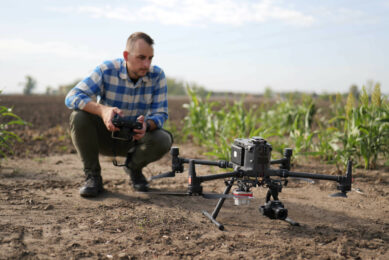Agribela Biodrop: bombing pests with parasitoids

Born in the Redfoot community of Londrina, Brazil, Agribela’s Biodrops boost the efficiency of biological pest control in multiple arable cultures.
Two different worlds were joined in Londrina, a city of 580,000 in Paraná state, Brazil. On one hand the agricultural tradition (it once had the biggest area of coffee on the planet) and on the other a vibrant urban youth, motivated and eager to change the world.
Innovation community: Redfoot
The first to see the potential was George Hiraiwa, former Agriculture Secretary of Paraná. In 2015 he decided to combine isolated efforts from SRP (Paraná Rural Society), private sector, university, research centres and specially the ‘nerds’ to create a robust innovation community. It is known as Redfoot.
Text continues underneath image
“I discovered innovation in a different area. As an agricultural engineer, I started to team up innovative developers with farmers. I am just a facilitator, just one of many participants. This is my pleasure. It is really amazing to see how ideas come true to improve the entire production chain. They are changing the world,” says Mr Hiraiwa.
More than 20 ag start-ups
Since 2016, the Redfoot community produced more than 20 ag start-ups that provide solutions for several cultures (soy, coffee, sugar cane, maize, etc.), animal production (even bees) and different links of the entire ag value chain.
Agribela’s Biodrops
One of these start-ups is Agribela. They invented a technology that makes biological pest control much easier and effective. It is called a Biodrop – a small ball of recycled paper, spreading parasitoids (natural enemies) against plague insects in large areas of soy, corn, sugar and tomatoes.
Text continues underneath image
Previously, biological control had to use recipients (like plastic glasses) that were positioned manually over plantations, reducing its benefits. That is why many farmers prefer chemical control until now. But Agribela’s Biodrops have started to change this.
“The idea came up in 2015. One year later we already initiated our start-up. We began with sugar cane, and realised that our solution was useful for other cultures too,” explains Luiz Arruda, Agribela’s founding partner.
Drones, tractors or airplanes
The process begins by measuring plague insect concentrations in the fields. If it is above infestation level, Biodrops are dispersed across plantations by drones, tractors or even airplanes. In this way, producers can cover much larger areas faster and reduce preventive use of chemicals in many cases.
To open up new possibilities, Agribela profited from the background of its founders. Mr Arruda has a Master’s degree in Agricultural Science and Gabriela Vieira, the other partner, in Entomology.
Text continues underneath image
Completely substitute chemicals
According to Luiz, biological control will grow with support of mechanisation and interaction between macro and micro parasitoids. In his opinion, this alternative can in some cases completely substitute chemicals (comestible fruits, for example).
“Currently, our main culture is cane with 3,300 hectares. But we have clients that produce soy, corn and even tomatoes. Each plague has its own natural enemies. Some of them are already well known. Our goal is to achieve 15,000 hectares of covering until 2021.”
Join 17,000+ subscribers
Subscribe to our newsletter to stay updated about all the need-to-know content in the agricultural sector, two times a week.



